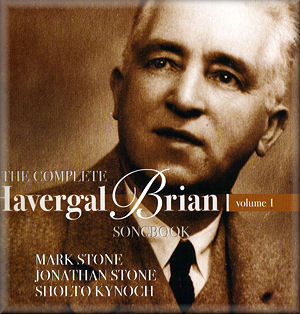 |
 |
|


alternatively
CD: MDT
AmazonUK
AmazonUS |
Havergal BRIAN
(1876-1972)
The Complete Songbook Vol.1
Three Songs for Contralto or Baritone Op. 6 (Sorrow song [3.57]
The message [2.01] Farewell [5.29])
Little Sleeper Op. 13a [5.29]
John Dowland’s Fancy [2.48]
Three Contemporary Songs (A faery song Op. 13c [2.06] The soul of
steel [4.30] Since love is dead [2.34])
Legend for violin and piano [6.52]
Three Elizabethan songs (When icicles hang by the wall [2.11] Care-charmer
sleep [4/21] Take, O, take those lips away [1.05])
Three Unison Songs: he mountain and the squirrel [1.24] The lost
doll [1.24] What does little birdie say [1.25])
Three Illuminations (The boys and the pastille [1.46] The butterfly's
waltz [1.24] Venus and a bobby [2.57])
Soliloquy Upon a Dead Child Op.l3a [5.29]
Three Songs for tenor Op.l3b (Day and night [5.02] When I lie ill
[3.08] If I could speak [2.38])
 Mark Stone (baritone), Jonathan Stone (violin), Sholto Kynoch (piano)
Mark Stone (baritone), Jonathan Stone (violin), Sholto Kynoch (piano)
rec. 25-26 August 2011, Potton Hall, Suffolk. DDD
 STONE RECORDS 5060192780154 [68.40]
STONE RECORDS 5060192780154 [68.40]
|
|
|
No doubt the numerous Havergal Brian fans will warmly welcome
this disc, yet my enthusiasm was regrettably tempered by the
performances and, in some cases, works, which I found to be
rather below par.
I rather felt, from the outset, that Mark Stone’s vocal
technique leaves something to be desired - his tone comes across
as forced in forte sections, and has a tendency to stray to
the flatwards side of the note. His vowels are often rather
distorted, and the enunciation is not particularly clear. On
occasion, I found the tone quality, manner and delivery inappropriate
for the song: such as in The Message, setting an anguished
poem by John Donne, which simply sounds jaunty, or in When
Icicles Hang by the Wall, for which song his voice is too
heavy; too leaden and earthbound. I lamented the lack of variety
of tone-colour. Stone also struggles for the lower notes (as
in The soul of Steel), and doesn’t appear to have
the support needed for high notes in piano sections - this resulting
in a thin tone and poor intonation. Without wishing to criticise
too astringently, one other very notable problem is that when
singing forte, the degree of the attack of the hard consonants
is out of proportion with the volume of the preceding or following
vowel sound, and this produces a sound that is rather harsh
and unpleasant on the ear.
Pianist Sholto Kynoch generally accompanies with sensitivity,
although I found myself feeling for the poor piano at times,
which was rather heavily thumped - as in John Dowland’s
Fancy. Nor, I’m afraid, was I particularly impressed
by violinist Jonathan Stone, who performs the Legend
for violin and piano - the consistently ‘passed’
bow during slurring is to the detriment of the lyricism of the
line, and the opening lacked security.
Stone’s habit of delaying the start of the vibrato on
long notes is also one that soon rankles. I’m sorry to
say that I can’t even praise the recorded sound - which
is rather poor, surprisingly so, given that the recording location
is the usually excellent Potton Hall.
The pieces themselves - for this isn’t just a songbook
- it contains piano works and, as previously mentioned, a work
for violin and piano - are a rather mixed bunch. I found John
Dowland’s Fancy slightly banal despite the fact that
it was composed at the suggestion of Havergal Brian’s
friend and fellow composer, Granville Bantock. I couldn’t
understand the Three Illuminations at all: musical realisations
of three completely pointless and nonsensical little stories,
with no direction or apparent meaning. We hear the influence
of Finzi in songs such as The soul of Steel but Havergal
Brian simply doesn’t have the mastery of that great composer,
and the gap in ability is glaringly detrimental to Brian.
Other oddities include an incorrect verse-form citation in the
notes; a disproportionately long silence at the end of Soliloquy
Upon a Dead Child; the inclusion of Three Songs for Tenor
(given that Stone is a baritone), and the inclusion of both
Little Sleeper and Soliloquy Upon a Dead Child
- two different texts with the same or very similar settings,
of which Brian himself urged the performance of the former version
only, disparaging the second poem.
On the plus side, the disc is beautifully produced, with pleasingly
spacious layout, photographs and so on. I just wish I could
have something more positive to say about the other elements
of it!
Em Marshall-Luck
|
|












